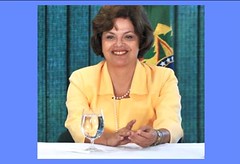
Dilma Rousseff of the Workers' Party in Brazil will be the national candiate for the presidency. She is expected to win the poll and become the next leader of this Latin American state.
Originally uploaded by Pan-African News Wire File Photos
Reuters.
SAO PAULO. RULING party candidate Dilma Rousseff is pulling away in Brazil’s presidential race, gaining momentum as the campaign shifts from social issues and back to the economic gains under her political benefactor, President Luiz Inacio Lula da Silva.
Rousseff extended her lead over opposition challenger Jose Serra to 10 percentage points in an opinion poll released yesterday.
It was the third poll this week to show her gaining ground after a rough few weeks in which a re-energised Serra narrowed the gap.
The survey by polling firm Datafolha showed Rousseff with 50 percent of voter support, compared to 40 percent for Serra, according to Folha de Sao Paulo newspaper, which commissioned the poll. When considering just valid votes, which excludes blank ballots, Rousseff held a 12-point lead with 56 percent to Serra's 44 percent.
Rousseff, the Workers’ Party candidate who is backed by the hugely popular Lula, had 47 percent in the Datafolha poll on October 15, compared to 41 percent for Serra, a former Sao Paulo state governor from the Brazilian Social Democracy Party.
The new Datafolha poll is likely to be met with unease inside the Serra camp, which sought to discredit two other recent polls showing Rousseff pulling ahead as politically biased and unreliable.
Rousseff, a 62-year-old career civil servant who has never before run for office, fell just short of winning the election outright in the first round of voting on October 3.
That was in large part because of an unexpectedly strong showing by Green Party candidate Marina Silva, who took 19 percent of the vote.
Rousseff, who served as energy minister and chief of staff in the Lula government, had 47 percent of the vote in the first round while Serra came away with 32.6 percent, forcing them into a runoff set for October 31.
The Workers’ Party emerged deflated from the first round and struggled to shift the focus of the campaign away from a corruption scandal involving a former aide to Rousseff as well as Rousseff's views on delicate social issues like abortion.
Serra, a seasoned politician who lost to Lula in the 2002 presidential election, seized the momentum and chipped away at Rousseff's lead by portraying her as an untested leader with questionable ethics.
The tide seemed to shift in Rousseff’s favor after the Green Party decided not to back a candidate in the runoff, quashing Serra’s hopes for an endorsement that would help him pick up swing voters. — Reuters.
No comments:
Post a Comment